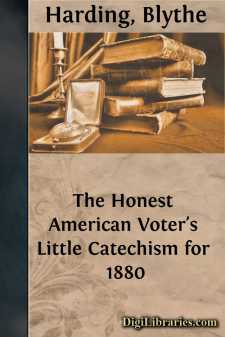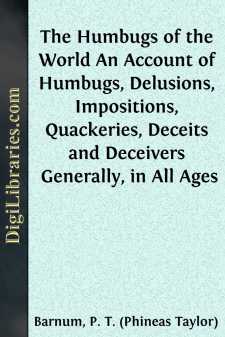Non-Classifiable
- Non-Classifiable 1768
Non-Classifiable Books
Sort by:
by:
Douglas Mawson
INTRODUCTION One of the oft-repeated questions for which I usually had a ready answer, at the conclusion of Sir Ernest Shackleton's Expedition (1907-09) was, "Would you like to go to the Antarctic again?" In the first flush of the welcome home and for many months, during which the keen edge of pleasure under civilized conditions had not entirely worn away, I was inclined to reply with a...
more...
by:
Blythe Harding
THE DIALOGUE. What is a republic? —A state, or Union of states, in which the people holds supreme power. How does the people exercise this power? —Through men elected for this purpose. What are these men called? —Senators and members of Congress or Congressmen. Is there a head or chief in a republic? —Certainly. What is he called? —The President. Must the President be elected? —Yes, by the...
more...
by:
F. C. Bishopp
KINDS OF FLIES FOUND IN HOUSES. Several species of flies are found commonly in houses. Some of them so closely resemble the true house fly that it requires very careful observation to distinguish them from it. One of these is the biting stable fly (fig. 1). It occurs frequently in houses and differs from the house fly in the important particular that its mouth parts are formed for piercing the skin....
more...
by:
Samuel Smiles
CHAPTER I. REVOCATION OF THE EDICT OF NANTES. The Revocation of the Edict of Nantes was signed by Louis XIV. of France, on the 18th of October, 1685, and published four days afterwards. Although the Revocation was the personal act of the King, it was nevertheless a popular measure, approved by the Catholic Church of France, and by the great body of the French people. The King had solemnly sworn, at the...
more...
One of Mr. Barnum’s secrets of success is his unique methods of advertising, and we can readily understand how he can bear to be denounced as a “Humbug,” because this popular designation though undeserved in the popular acceptation of it, “brought grist to his mill.” He has constantly kept himself before the public—nay, we may say that he has been kept before the public constantly, by the...
more...
by:
Tom Bullock
INTRODUCTION I have known the author of "The Ideal Bartender" for many years, and it is a genuine privilege to be permitted to testify to his qualifications for such a work. To his many friends in St. Louis, Louisville, Cincinnati, Chicago and elsewhere, my word will be superfluous, but to those who do not know him, and who are to be the gainers by following his advices, it may prove at the...
more...
HISTORICAL ANALYSIS Francis Tresham, of Rushton, in Northamptonshire, has recently (September 11, 1605) succeeded his father, Sir Thomas Tresham (a great sufferer for the Roman Catholic religion), in an inheritance of at least five thousand a year, in present money; after having, as he says, spent most of his time overburdened with debts and wants, and resolves within himself to spend his days quietly....
more...
by:
John Wilson
IN preparing a work for the press, the author, the compositor, and the proof-reader are the three factors that enter into its construction. We will, however, treat more especially of the last-named in connection with the first. The true proof-reader should not only be a practical printer, but he should be a lover of literature, familiar with the classics of all languages, with the results accomplished...
more...
INTRODUCTORY. It should not be hard for the general reader to understand that the influence which is the theme of this dissertation is real and explicable. If he will but call the roll of his favorite heroes, he will find Sigurd there. In his gallery of wondrous women, he certainly cherishes Brynhild. These poetic creations belong to the English-speaking race, because they belong to the world. And if...
more...
One might write continuously while he lived for or against Socialism and yet at the end of a long and misspent life have said nothing that others had not said before him. Nevertheless, new generations come on and have to learn about Socialism as they learn about other things, for there always have been and always will be Socialists. It is a habit of mind which becomes fixed in a certain number of each...
more...











